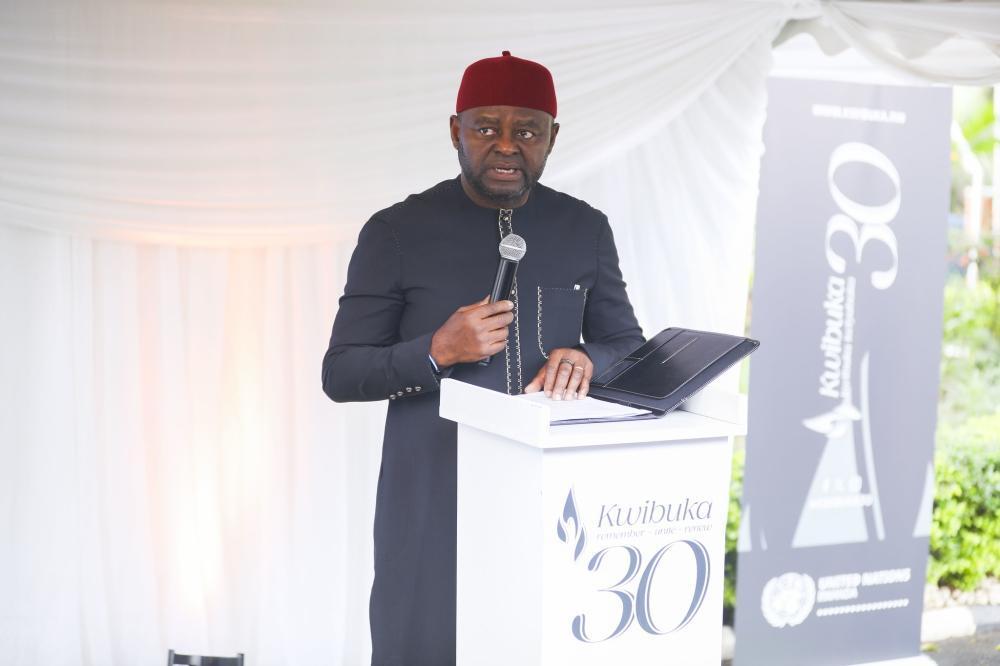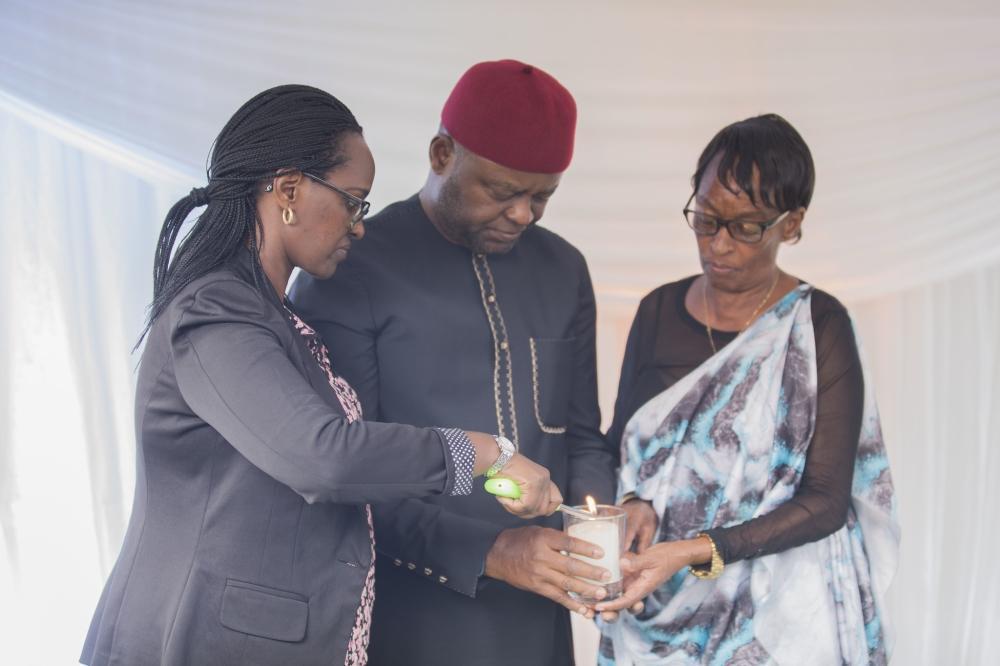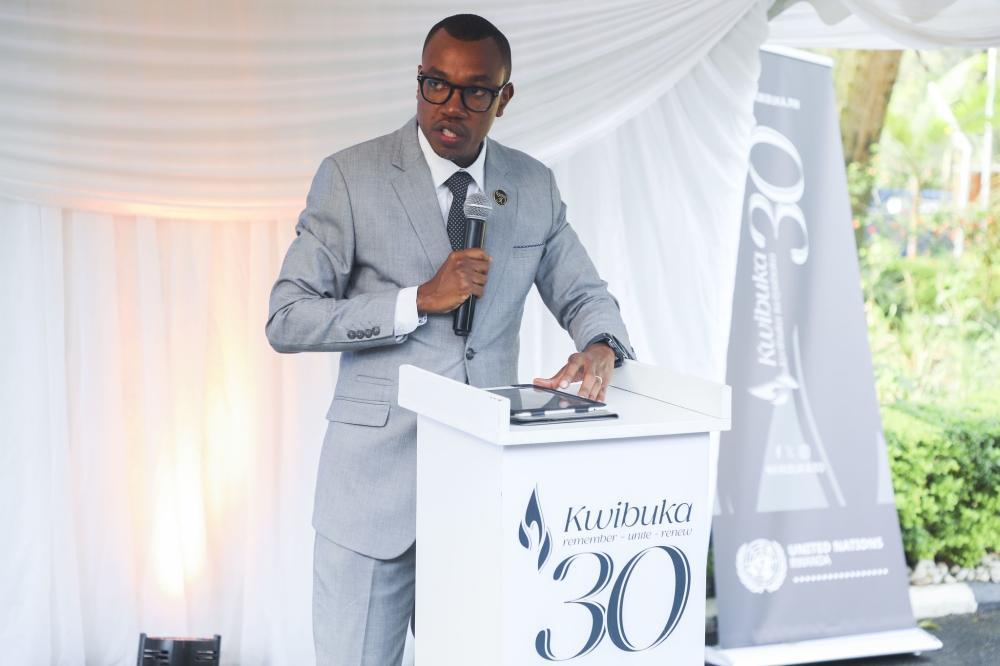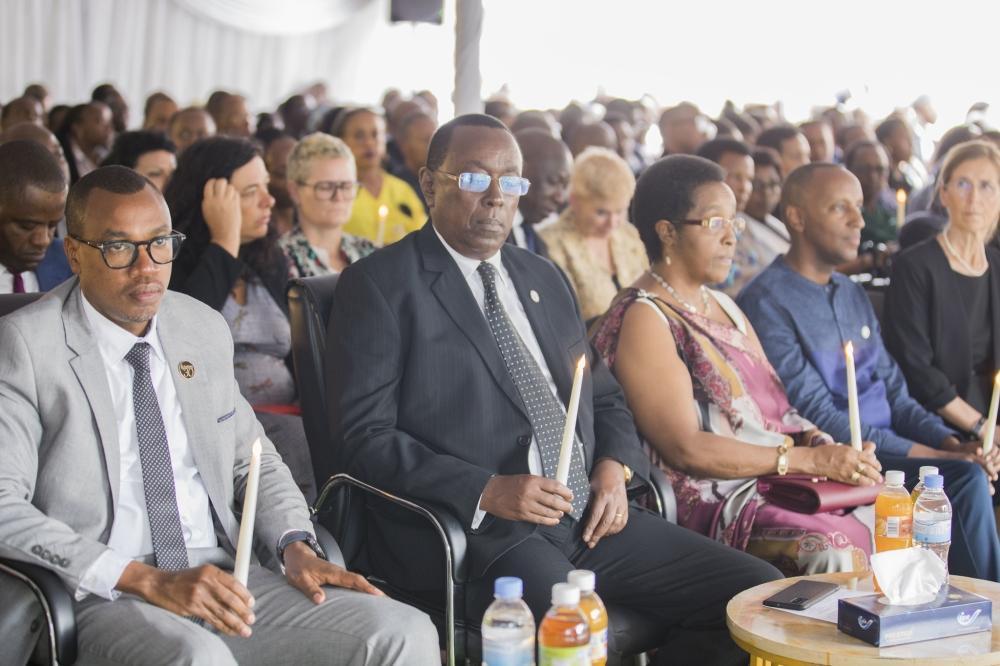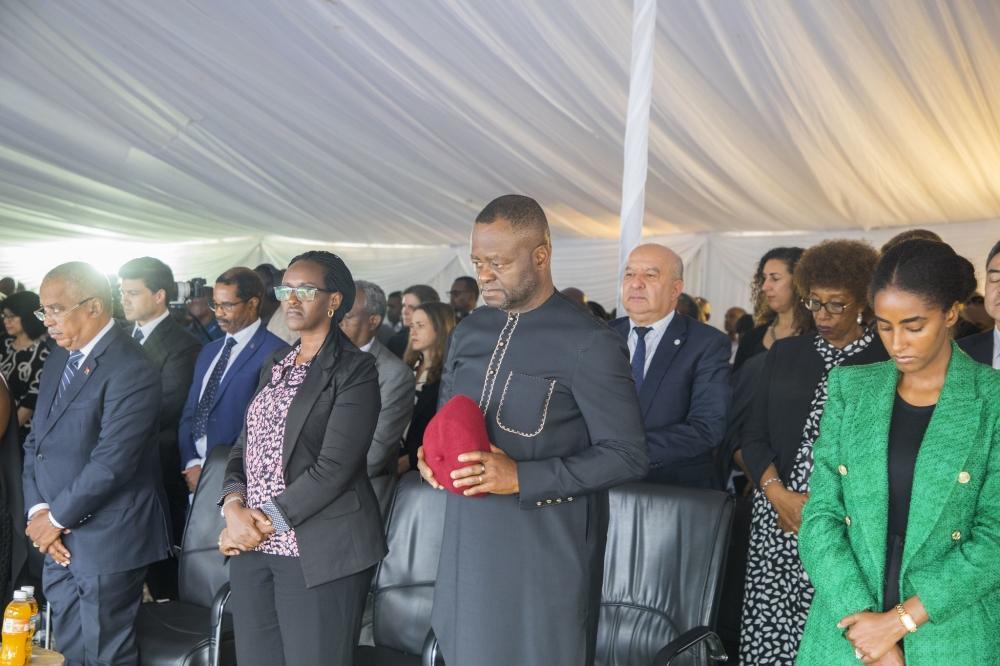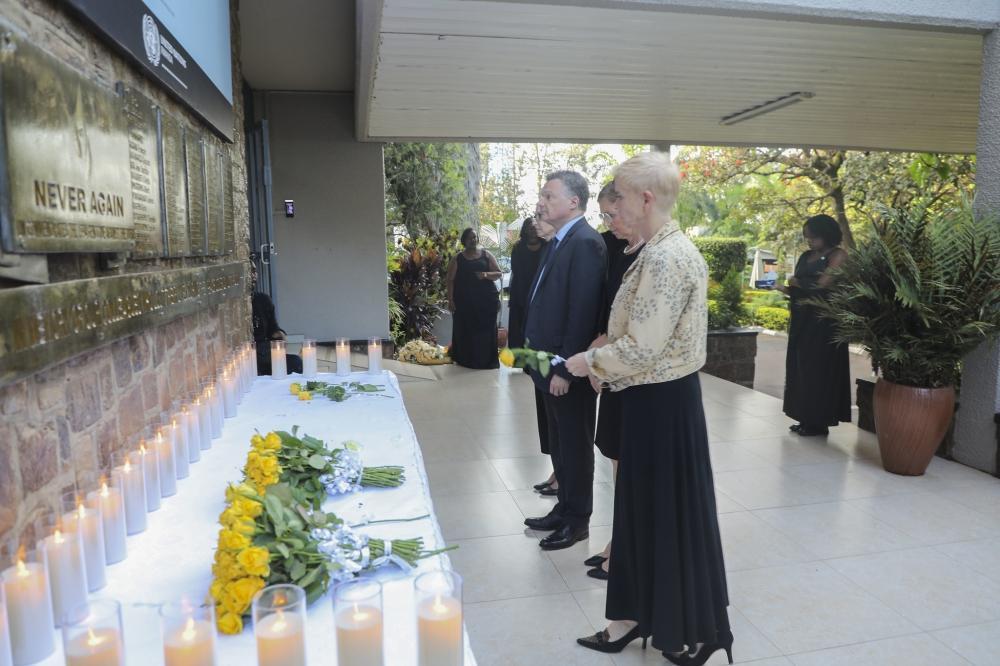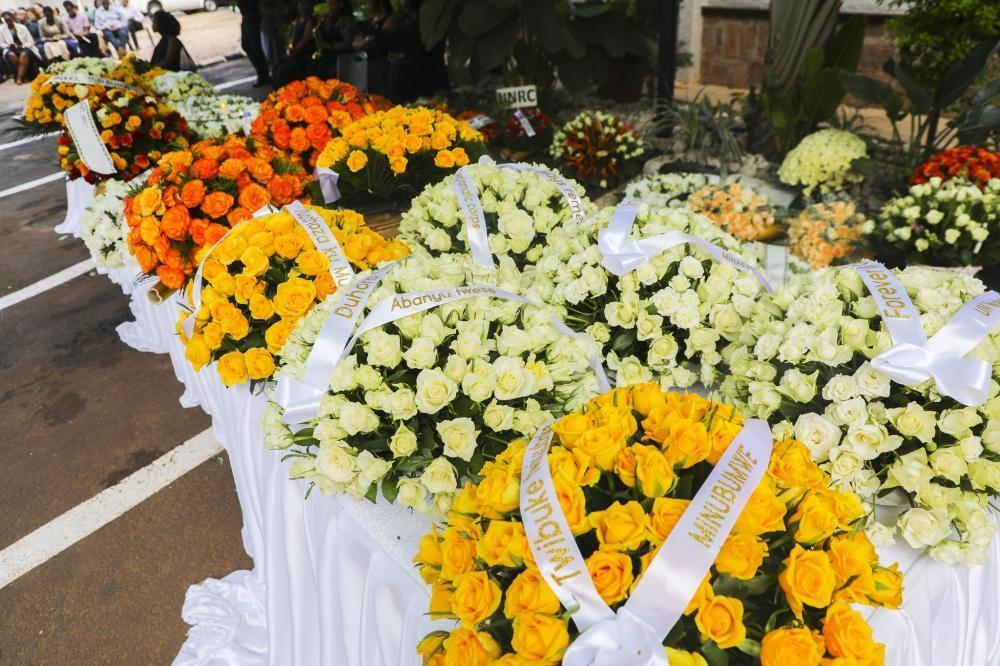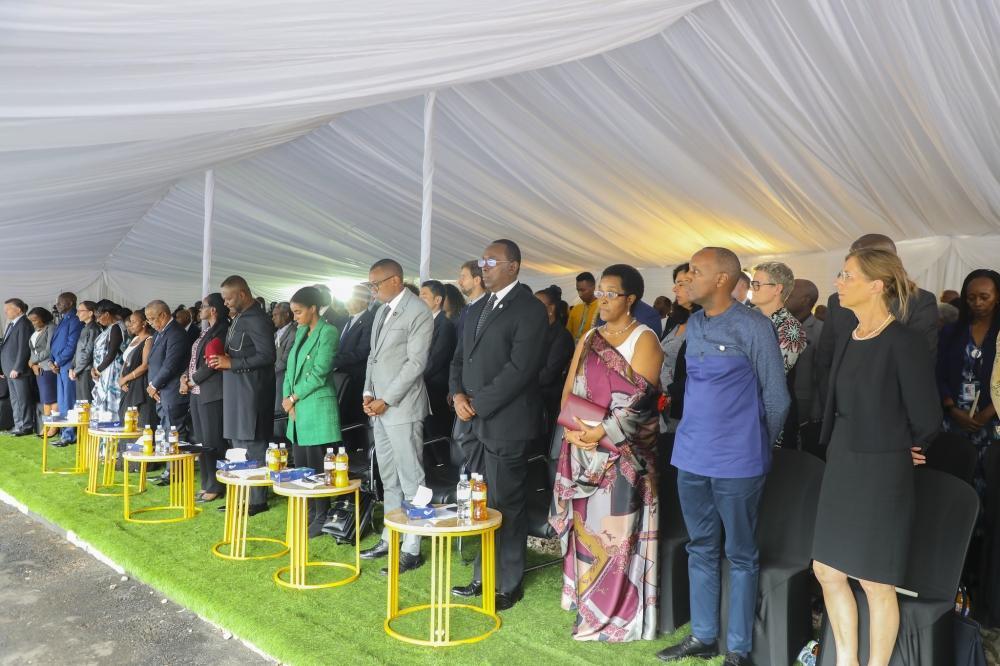Africa-Press – Rwanda. The United Nations in Rwanda paid tribute to 68 former staff members who were killed during the 1994 Genocide against the Tutsi. During the commemoration, it was acknowledged that the international community failed to prevent or effectively respond to and stop the Genocide.
Held at the United Nations Development Programme (UNDP) offices in Kigali on April 30, the event was organised as part of the 30th commemoration period and brought together distinguished attendees, including UN officials in Rwanda, government officials, diplomatic corps, Genocide survivors, and the families of the deceased UN staff.
Speaking at the event, Ozonnia Ojielo, the Resident Coordinator of UN Rwanda, said that 30 years ago, the world witnessed unspeakable atrocities as Rwanda was engulfed in a genocide that claimed the lives of over one million innocent men, women, and children.
“Among the victims were brave UN staff members who dedicated their lives to promoting peace, human rights, and development in Rwanda. And today, and in fact every day, we must honour the memory of the UN staff members who perished during the 1994 Genocide against the Tutsi,” he noted.
UN Resident Coordinator in Rwanda, Ozonnia Ojielo addresses mourners during the commemoration of formers UN employees who were killed in the Genocide. Photos by Craish Bahizi
He added: “Each name we see here on this memorial represents the life of a cherished member of our UN family. They were not just colleagues; they were sons, daughters, fathers, mothers, brothers, and sisters. Let us hold their faces and their contributions to society close to our hearts, ensuring that their legacies live on through our actions and remembrance.”
Ojielo echoed President Paul Kagame’s words during the official commemoration event on April 7, where the Head of State talked about the loneliness and longing for loved ones that people struggle with; for family members they will never meet, and the impossible burden of reconciliation that survivors are carrying.
He noted: “If one has not experienced mass violence, it is very difficult to understand or appreciate the price of reconciliation. Very often, it is the victim who pays the price of reconciliation – of being asked to make the perpetrator welcome in society again – of being asked to forego their pain and injury to avoid the cycle of revenge and so that the outside world can comfort itself that its ignominious acts of indifference have been forgiven, if not forgotten. But reconciliation is a journey as well as a process.”
Ozonnia Ojielo, the Resident Coordinator of UN Rwanda, leads other mournes to lignt candles at the event
He added: “However, in the aftermath of the Genocide, as the UN, we embarked on a journey of reflection and action. We recognise that the international community failed to prevent or effectively respond to the Genocide, and we acknowledge our collective responsibility to prevent such horrors from ever happening again.
“Going forward, let us reaffirm our commitment to the principles of humanity, solidarity, and justice. Let us strive to build a world where every individual can live free from fear and persecution, regardless of their ethnicity, religion, or nationality.
“We owe this much to our fallen colleagues, we owe it to Rwanda and the Rwandan people, we owe it to ourselves.”
UN Resident Coordinator in Rwanda, Ozonnia Ojielo, pays tribute to victims during the commemoration of formers UN employees who were killed in the Genocide. Photos by Craish Bahizi
Louis de Montfort Mujyambere, First Vice-President of Ibuka, the umbrella organisation for Genocide survivors’ associations, said the commemoration of the 1994 Genocide against the Tutsi is not simply an act of remembrance, it is a solemn duty that “we owe the victims; men, women, and children who were dehumanised and harshly killed simply because of their Tutsi ethnicity.”
Louis de Montfort Mujyambere, First Vice-President of Ibuka speaks at the commemoration event of 68 former UN employees massacred during the Genocide
Mujyambere highlighted that hosting this event is a way to honour the memory of over one million innocent lives lost and urge action against genocide and its ideology, ensuring it never happens again. Achieving this requires holding accountable those responsible for these crimes and providing justice to Genocide survivors.
He said: “It is known that numerous genocidaires have sought refuge in various countries, avoiding accountability and perpetuating impunity. We urge the UN to pressurise its member states to fulfil their international legal obligations, ensuring that these perpetrators face justice. No individual should evade accountability for their involvement in genocide, irrespective of their location or any political motivations.”
Mujyambere further noted that on April 11, it was acknowledged that the international community failed to prevent or stop the 1994 Genocide against the Tutsi.
Members of the families of the deceased UN staff pay tribute to 68 former staff members who were killed during the Genocide against the Tutsi, on Tuesday, April 30. All photos by Craish Bahizi
“In this regard, Ibuka organised a ‘walk to remember’, from the former ETO Kicukiro, currently IPRC, to the Nyanza memorial site. This event honours the Tutsi who sought refuge at the ETO, where UN peacekeepers from Belgium were stationed. However, these peacekeepers abandoned them, leaving them at the mercy of the Interahamwe, resulting in their tragic deaths. Similarly, the French army repatriated their nationals on April 9 and 10, 1994, in Kibungo, Kibuye, and Ndera, but left thousands of Tutsi vulnerable to their killers,” he said.
“Ibuka is concerned about individuals or institutions using unclear language to refer to the Tutsi group targeted in the Genocide. To ensure “Never Again” becomes a reality, consistency in statements is vital, as the 1994 Genocide against the Tutsi is an undeniable historical fact,” he noted.
The event featured lighting candles symbolising the ‘flame of hope’, a performance by the Ambassador of Christ Choir, and laying wreaths at the monument with the names of former staff who were killed. Families, heads of UN agencies, and government officials paid tribute accordingly.
Bernard Makuza (C) was among hundreds of mourners who turned up for commemorating former UN employees.
The United Nations in Rwanda employees and other mourners observe a moment of silence to pay tribute to 68 former staff members who were killed during the 1994 Genocide against the Tutsi, in Kigali on Tuesday, April 30, 2024. All photos by Craish Bahizi
Members of the diplomatic corps pay respect to victims of the Genocide againt the Tutsi
The commemoration event took place at the United Nations Development Programme (UNDP) offices in Kigali on Tuesday, April 30.
The event was attended by UN officials in Rwanda, government officials, diplomatic corps, Genocide survivors, and the families of the deceased UN staff.
The United Nations in Rwanda employees and other mourners observe a moment of silence to pay tribute to 68 former staff members who were killed during the 1994 Genocide against the Tutsi. Craish Bahizi
For More News And Analysis About Rwanda Follow Africa-Press


